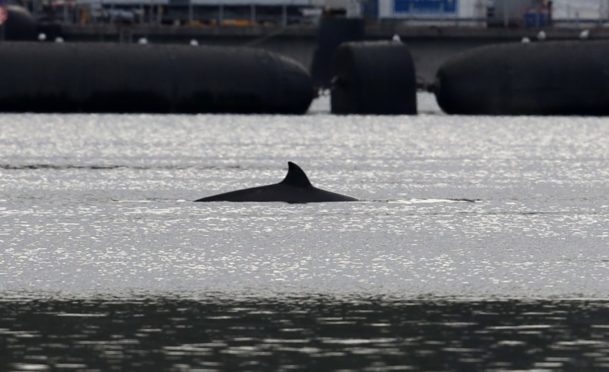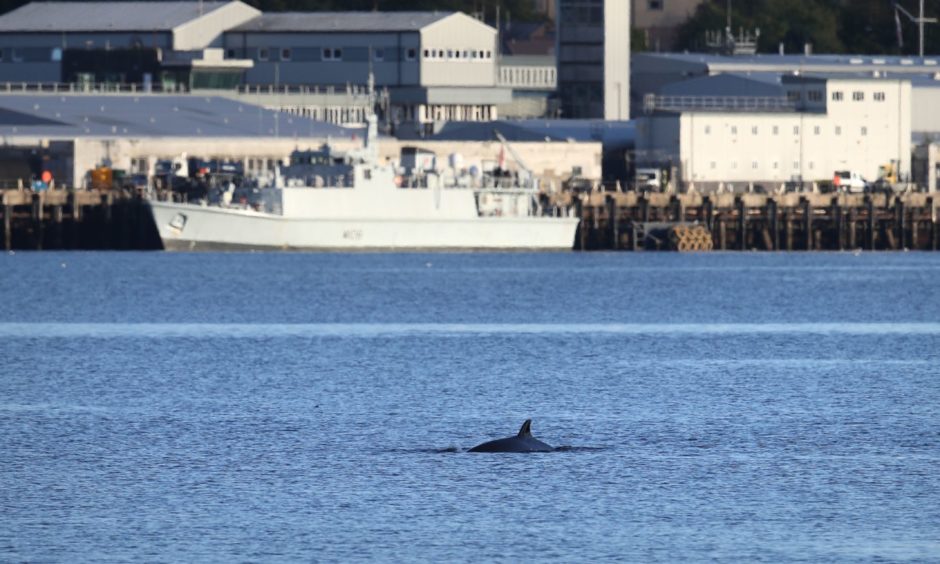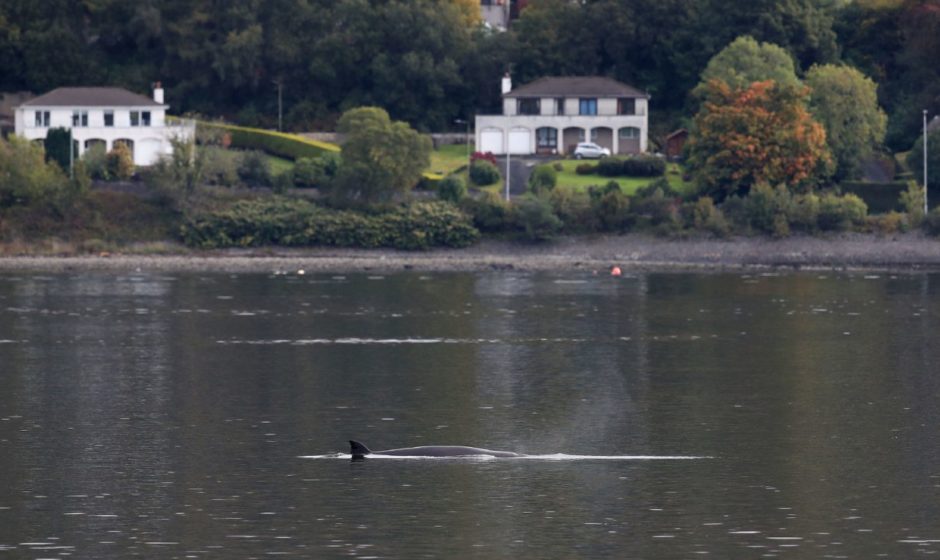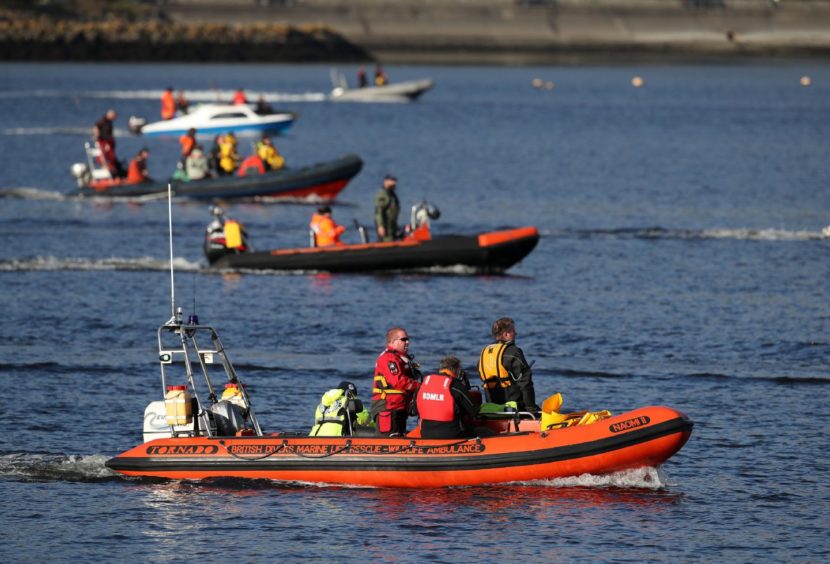
Attempts to herd a pod of whales from a Clyde sea loch have proved unsuccessful.
A flotilla of vessels led by the British Divers Marine Life Rescue (BDMLR) charity, with support from a number of other organisations, had tried on Thursday to move the northern bottlenose whales out of Gare Loch and towards the Firth of Clyde.
There are concerns over the animals’ welfare, as they are outwith their natural habitat.
There is also the added problem of a major international naval exercise commencing in the area this weekend, with whales sensitive to underwater sound like sonar.
Exercise Joint Warrior, which involves UK, NATO and other allied forces, will see a number of ships and thousands of military personnel undergo training around Scotland’s coast.
Rescuers decided not to return for a second day as they recognised chances of success would be limited.
Crews took to the water yesterday in a group of small boats with the plan being to surround the animals, repelling them with engine noise towards the mouth of the loch, into the main estuary and towards the sea.
Other groups of boats were to block any channels the whales could swim up instead of maintaining course down the Firth, including Loch Long and Holy Loch.
Medics and coastguard teams were on stand-by on land throughout.
A BDMLR statement said: “On forming up, two adult northern bottlenose whales were spotted and the boats moved into position and began to drive forward, however the animals soon evaded the line and surfaced behind the boats.
“The group reset the position upwater of the whales, repeating this pattern of events several times, slowly moving the animals south and improving cohesion of the line as well as being joined by a RIB from Marine Scotland out of Largs.
“Just after midday, the group were able to keep the animals moving forward and herded them to the mouth of the Rhu Narrows where they were lost in the deeper water; this pair were not identified again in the Loch while boats were in the water so are suspected to have left through the narrows at that point.”
Three animals were then spotted from land in the water south of Garelochead, rescuers said, a parent and child pair and a single large adult.
The statement continued: “This proved difficult to manage as what were essentially two groups kept far enough apart that they couldn’t be driven together.
“The team concentrated on the pair, attempting to drive them south however they proved very elusive and so the team concentrated on the single whale when the pair evaded and stayed submerged.
“Around 3pm, having had numerous attempts to drive the animals, the decision was made to resort to using banging poles. By this point, we had moved all boats from outside the loch inside to attempt to put as much noise as possible into the water to drive the animals south.
“Several more short attempts were made and evaded, however the whales were driven south to Roseneath before evading and on subsequent attempts were herded to the Rhu Narrows again.”
Boats were stood down at around 5:40pm yesterday after further searches for the animals were unsuccessful in the fading light.
It was decided that crews would not return for a second day.
The statement added: “During debrief, a decision was made not to return for a second day due to uncertainty whether we could bring the same number of boats and crews back to the scene; concern over stress levels in the animal and that simply repeating the same manoeuvres would not be any more likely to succeed given the geography and behaviour of the whales.
“Given there are no previous international records of northern bottlenose whales being herded and the overall gaps in knowledge about the species, combined with the geography of Gareloch this was always going to be a difficult attempt with success not guaranteed.
“We have however leant a great deal about the behaviour of these whales for any future relocation of the species and given the short window for organising and conducting the relocation attempt, we are hugely proud of the efforts of the BDMLR team and likewise grateful to the many organisations who assisted this endeavour.
“Our medics and teams will continue to monitor both the area and the whales behaviours and movements and will reassess the situation is required.”
The charity is concerned about the length of time the animals have spent in the area.
Over time, a lack of suitable feeding options may see them grow weak and unable to find their way back to their usual habitat,
Gavin Lemon, a volunteer with BDMLR, told the BBC that it was important to move the animals while they were healthy and in good condition.
“We’ve been monitoring them – they are feeding on local fish,” he said.
“They usually like squid and the like, diving up to 1,000m (3,000ft).
“Gare Loch is about 25m (80ft) deep. So they’ve not been having their normal diet, but it has been sustaining them.”
The Joint Warrior training drills are set to begin on Sunday, with most planned to take place further out to sea.
A number of ships have been arriving on the Clyde however, with one ship stationed at Faslane and a number of frigates docked in Glasgow.
The Ministry of Defence has been liaising with the BDMLR and other groups to assist where possible.

Enjoy the convenience of having The Sunday Post delivered as a digital ePaper straight to your smartphone, tablet or computer.
Subscribe for only £5.49 a month and enjoy all the benefits of the printed paper as a digital replica.
Subscribe © PA
© PA © Andrew Milligan/PA Wire
© Andrew Milligan/PA Wire © Andrew Milligan/PA Wire
© Andrew Milligan/PA Wire